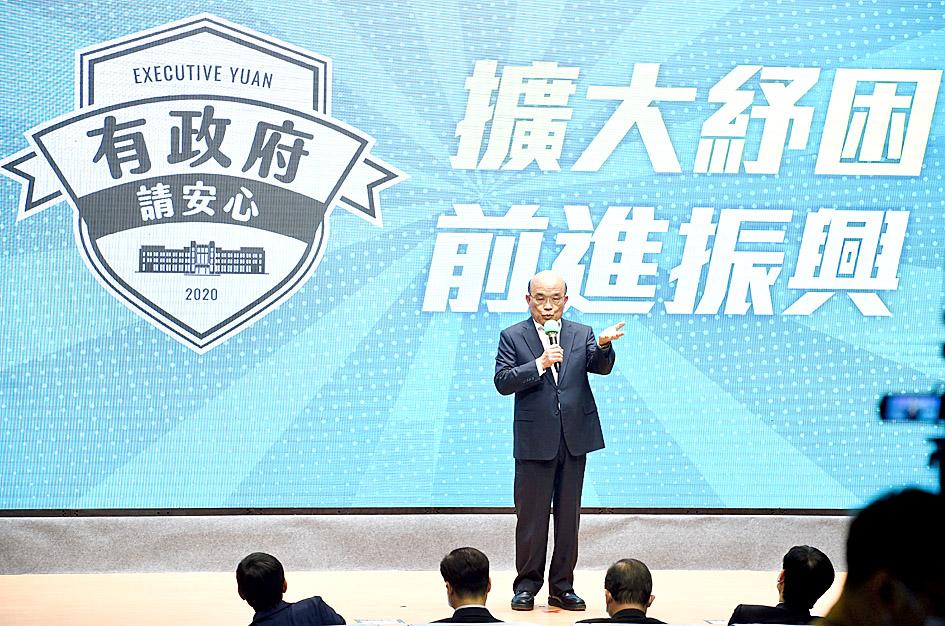The government is to offer a one-time payment of NT$10,000 to workers not covered by social insurance programs, as well as farmers and fishers who do not qualify for other forms of financial aid, to mitigate the economic effects of the COVID-19 pandemic, Premier Su Tseng-chang (蘇貞昌) said yesterday.
Among those eligible are an estimated 340,000 people who work, but are not enrolled in labor insurance, farmers’ insurance, or any other social insurance program and have a household income of 1.5 to two times the average minimum living cost in their city or county, Su said.
They include people who hold advertisement placards outdoors, street vendors and small-scale self-employed people, he said, adding that they would have access to the funds from Monday next week.

Photo: Peter Lo, Taipei Times
Under a previous version of the program, those with a household income of less than 1.5 times the average minimum living cost in their city or county were eligible for a one-time payment of NT$30,000.
In addition to the 340,000 eligible people, about 1.4 million farmers and fishers who make less than NT$500,000 annually and do not qualify for the NT$30,000 grant can apply for the NT$10,000 grant starting on Monday next week, Council of Agriculture Minister Chen Chi-chung (陳吉仲) said.
About 150,000 fishers who have labor insurance and have a monthly salary of less than NT$24,000 and an annual income of less than NT$400,000 are eligible for a one-time payment of NT$30,000, Chen said.
However, none of Taiwan’s more than 1 million farmers qualify for that payment, he added.
Farmers and about 200,000 fishers who have farmers’ insurance or no insurance may apply for the NT$10,000 payment instead, Chen said.

The manufacture of the remaining 28 M1A2T Abrams tanks Taiwan purchased from the US has recently been completed, and they are expected to be delivered within the next one to two months, a source said yesterday. The Ministry of National Defense is arranging cargo ships to transport the tanks to Taiwan as soon as possible, said the source, who is familiar with the matter. The estimated arrival time ranges from late this month to early next month, the source said. The 28 Abrams tanks make up the third and final batch of a total of 108 tanks, valued at about NT$40.5 billion

Two Taiwanese prosecutors were questioned by Chinese security personnel at their hotel during a trip to China’s Henan Province this month, the Mainland Affairs Council (MAC) said yesterday. The officers had personal information on the prosecutors, including “when they were assigned to their posts, their work locations and job titles,” MAC Deputy Minister and spokesman Liang Wen-chieh (梁文傑) said. On top of asking about their agencies and positions, the officers also questioned the prosecutors about the Cross-Strait Joint Crime-Fighting and Judicial Mutual Assistance Agreement, a pact that serves as the framework for Taiwan-China cooperation on combating crime and providing judicial assistance, Liang

A group from the Taiwanese Designers in Australia association yesterday represented Taiwan at the Midsumma Pride March in Melbourne. The march, held in the St. Kilda suburb, is the city’s largest LGBTQIA+ parade and the flagship event of the annual Midsumma Festival. It attracted more than 45,000 spectators who supported the 400 groups and 10,000 marchers that participated this year, the association said. Taiwanese Designers said they organized a team to march for Taiwan this year, joining politicians, government agencies, professionals and community organizations in showing support for LGBTQIA+ people and diverse communities. As the first country in Asia to legalize same-sex

MOTIVES QUESTIONED The PLA considers Xi’s policies toward Taiwan to be driven by personal considerations rather than military assessment, the Epoch Times reports Chinese President Xi Jinping’s (習近平) latest purge of the Chinese People’s Liberation Army (PLA) leadership might have been prompted by the military’s opposition to plans of invading Taiwan, the Epoch Times said. The Chinese military opposes waging war against Taiwan by a large consensus, putting it at odds with Xi’s vision, the Falun Gong-affiliated daily said in a report on Thursday, citing anonymous sources with insight into the PLA’s inner workings. The opposition is not the opinion of a few generals, but a widely shared view among the PLA cadre, the Epoch Times cited them as saying. “Chinese forces know full well that